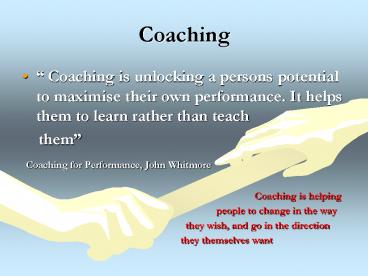Coaching - PowerPoint PPT Presentation
Title: Coaching
1
Coaching
- Coaching is unlocking a persons potential to
maximise their own performance. It helps them to
learn rather than teach - them
- Coaching for Performance, John Whitmore
-
Coaching
is helping -
people to change in the
way -
they wish, and go in the direction -
they themselves want
2
Coaching
- Google hits
- Coaching 86,000,000
- Coaching Development 31,7000,000
- Coaching Business 40,600 000
- Coaching Leadership 7,290,000
- Performance Coaching 340,000
- Performance Coaching (UK only) 71,300
3
Coaching
- A coach is neither a counsellor nor a therapist
- A coach guides the individual to explore,
- experiment, and learn new skills
- A coach avoids advising or
- instructing
4
Coaching
- Coaching does not focus upon what has gone
before. It is totally focussed upon where the
individual is now and where they want
to be in the future
5
Coaching
- Principles of coaching
- The person being coached is resourceful
- The coachs role is to spring loose the
individuals resourcefulness - The person being coached sets the agenda
- The coach and person being coached are equals
- Coaching is about action and change
6
Coaching
- What are the barriers to
- your success?
7
Coaching
- The biggest barrier is YOU
- Performance potential interference
- (The inner game of .)
If you really want to do something, you'll find
a way. If you don't, you'll find an excuse!
8
Coaching GROW Model
Reality
Topic
Goal
Options
Will
9
Coaching
Whats stopping you?
What do you want?
How will you know When you have got it?
What are your options?
What are you going to do now?
10
Coaching
- If you continue to do what you have always done
you will get what youve always got - If your doing something that is
- not working, do something
- different
-
There is no failure -
only feedback
11
Coaching Questions
- What do you want to achieve?
- Improve a relationship
- Manage time better
- Acquire a new skills
- Feel more confident
- Find a way forward
12
Coaching
- (T) What do you want to achieve?
- What is the focus of this meeting?
- What by the end of this session,
- what would be a good outcome?
- What do you want to work
- on today?
-
- Develop the want as -
a positive -
- Be as SMART as -
practical
13
Coaching Questions
- (G) How will you know when you have got it?
- What will it be like?
- How will you feel?
- What will be different?
- What will you be doing?
-
Use sensory evidence - such as
sound, see, feel
14
Coaching Questions
- (R) Whats stopping you?
- What are some of the perceived barriers?
- What are the limitations that you place upon
yourself? - What might be some of the consequences of
achieving what you want?
15
Coaching Questions
- (O) How might you achieve this?
- What resources do you have?
- What has worked for you in the past?
- What is your level of motivation?
- Who might be able to help
- you?
16
Coaching Questions
- (W) So what are you going to do?
- Close the deal
- Be specific
- Remember to consider rewards
17
Coaching
- The art of coaching is to assist the individual
to identify their own answers to a
stated situation
18
Summary
- Coaching enables clients to
- Remember what has been forgotten
- Find the motivation to take action
- Develop practical strategies for higher
performance - Deliver effectively against defined targets
- Commit to improvement
- Communicate more clearly and with more impact
19
Coaching
- Formula for Success
- Know your outcome
- Take action to achieve this outcome
- Evaluate your actions to determine degree of
success - Be flexible, be prepared to modify or change
actions - (Jill
Rodgers, 2004)
20
Coaching
- It is suggested that Thomas Edison was asked if
he ever got discouraged when his first 700 trials
failed to work, replied, I
havent failed Ive discovered 700
ways how not to do
it.































